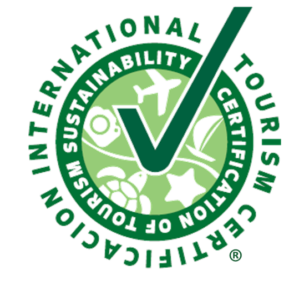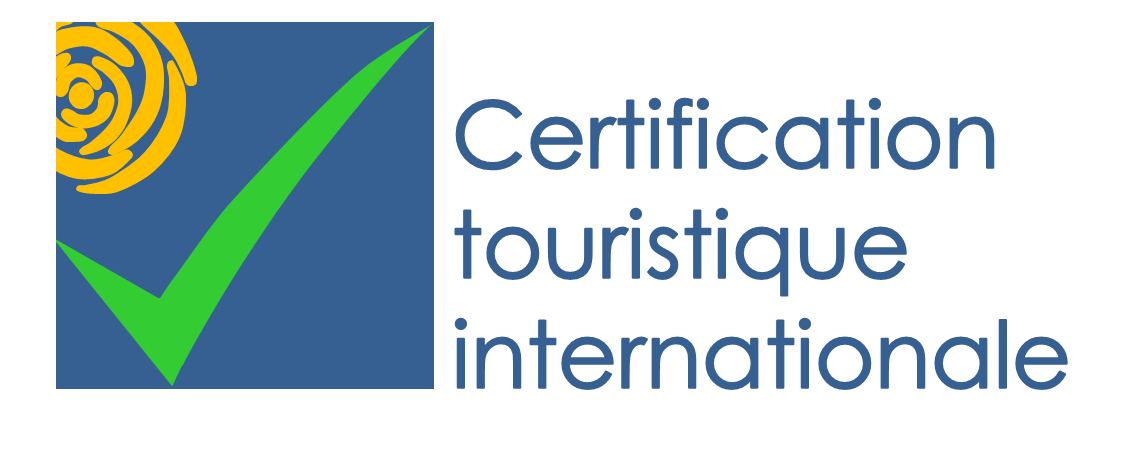 The Certification of Tourism Sustainability® is an international mechanism that gives recognition to those tourism services that comply with the social responsibility, environmental quality and management standards. The Certification of Tourism Sustainability® is an initiative validated and promoted by Tourism Certification International (TCI) and other development organizations like Care International, Conservation International, and Social and Ecological Solidarity (SES), international organizations present in industrialized and developing countries, that after analyzing the strengths and weaknesses of tourism development proposed a certification system that allows the evolution of tourism services to a more sustainable level, and that may grant a recognition for such improvement.
The Certification of Tourism Sustainability® is an international mechanism that gives recognition to those tourism services that comply with the social responsibility, environmental quality and management standards. The Certification of Tourism Sustainability® is an initiative validated and promoted by Tourism Certification International (TCI) and other development organizations like Care International, Conservation International, and Social and Ecological Solidarity (SES), international organizations present in industrialized and developing countries, that after analyzing the strengths and weaknesses of tourism development proposed a certification system that allows the evolution of tourism services to a more sustainable level, and that may grant a recognition for such improvement.
Request the Certification of Tourism Sustainability®
A Valid Interested Party (VIP) is an actor, entrepreneur, community, family or individual, that provides a tourism service or a service directly associated to tourism (guiding, walks, cruise, tour, accommodation, transport, food, etc) and that has a legitimate interest to strengthen the sustainability of their actions. To register and to request the Certification of Tourism Sustainability® (CTS), the Valid Interested Party (VIP) must enclose with the formal request documents that prove its existence and its legitimate interest to be certified. Among these documents we have: i) Document of registration(s) to the Tax authority(s) where the tourism activity is developed, ii) Request for Certification, description of activities and declaration expressing the legitimate interest to be certified, and explaining the reasons that motivate such interest (Form 1). Have all these documents signed and scanned in pdf format and ready at the moment of the registration. To access the Form 1, please make click here.
Validated Standards
The Certification of Tourism Sustainability® is based on standards that have been validated mainly through development projects, especially in countries with environmental conflicts and social and economic weaknesses, for more than ten years. After this validation process this certification process has been introduced as an alternative to promote tourism in a sustainable way. For many poor communities in the development world, tourism is one of the activities that compose the family development basket, and that is included in the holistic family survival approach.
In this way, our approach for a more sustainable tourism is to consider it as part of the alternatives that families have and that integrate with other economic activities conforming at the same time the holistic community development approach.
Measuring Our Impact
Tourism Certification International (TCI) is committed maintaining international quality and responsibility standards. We make sure that communities, we work with, may express themselves during planning and implementation processes, as well as in evaluating our performance, so then we measure our impact through monitoring and evaluating our internal and external activities. To make sure the quality of these processes, we measure results and changes that take place in people’s life as a result of our work through a series of monitoring mechanisms like “Measuring Assessments During Implementation” (MADI) and external evaluations.
Ensuring Transparency
Tourism Certification International (TCI) evaluation Policy is one way of ensuring transparency, as it requires that terms of reference, findings, lessons-learned and recommendations of external evaluations of humanitarian action are placed in the public domain. All Tourism Certification International (TCI) external evaluation reports can be seen at this website upon request.
Tourism Certification International (TCI) is a signatory to and holds itself accountable to internationally accepted humanitarian standards and codes of conduct, and we work with other aid organizations and United Nations agencies to improve humanitarian action and to influence policy.
 If you are a Valid Interested Party (VIP), either, a private company, an association, a cooperative, a community or an individual that provides tourism services, and that has more than one year working and it is registered at your Country's Tax Authority, then you can apply to obtain the Certification of Tourism Sustainability®.
If you are a Valid Interested Party (VIP), either, a private company, an association, a cooperative, a community or an individual that provides tourism services, and that has more than one year working and it is registered at your Country's Tax Authority, then you can apply to obtain the Certification of Tourism Sustainability®.
Who can obtain the Certification?
The Certification of Tourism Sustainability® can be requested by a Valid Interested Party (VIP), who could be a private company, association, cooperative, community or a natural person registered at the Country's Tax Authority as a provider of any of the direct tourism services as, food supply, tours, guiding, lodging, transportation or any other complementary services. A travel agency can request the Certification of Tourism Sustainability® under special conditions, as for example, if more than the 50% of the sales volume is provided by Certified enterprises or communities that hold the Certification of Tourism Sustainability® and the rest have the commitment to obtain the Certification at the short term, or if the travel agency becomes a promoter of the Certification of Tourism Sustainability® and obtains the commitment of its tourism service providers to obtain the Certification at the short term.
The standards are an effective way to think globally and act locally.
The tragedy of the commons could be avoided if we change things locally, like for instance from the consumers’ standpoint, who, by choosing a certified sustainable tourism service pushes sustainability, or from the tourism entrepreneurs who by becoming more responsible, makes a better world. We also have the opportunity to make a change, by telling our friends to choose the right way: certified tourism services.
Tourism Certification International (TCI) trusts the Valid Interested Party (VIP) as a new potential permanent partner and wants to develop a certification process based on trust. This is the reason that allows a self-evaluation in the first place. However, Tourism Certification International (TCI) has the capacity to develop evaluations through different means and actors, like from a confidential report made by a tourist or an auditing process carried on by one of our auditors.
Methodology of the Certification
This methodology explains the stages that an enterprise or communities follow to obtain the Certification.
It is understood that the enterprises or the communities that do not comply with the 100% of applicable standards, will prepare an Action Plan to comply with most of the standards at a certain period of time.
So far, all the enterprises and communities that have requested the Certification have obtained it.
The standards are an instrument to promote sustainability. Standards define a path to follow and are a way to create disincentives to pollution and social disruption. Tourism entrepreneurs have now the choice to use them or not, but if they do, they will obtain the recognition of other organizations, and especially from consumers, which is very important at the present time because nowadays, more than ever, more people choose products and services that are responsible with the environment and societies.
The standards and their indicators elaboration, in their first version, took four years of continuing research, 32 workshops in 12 countries, 6 pilot experiences in 6 countries, seminars with more than 1000 participants, partnerships with four international organizations, eighteen local organizations, as well as the review of most of the available literature and past experiences to promote tourism in a sustainable way. Even with the research developed, the standards and their indicators still are in permanent evaluation and up to date, which allows us to state that or standards are validated. Our commitment is with both, present and future generations.
Stages of the Certification
i. The request properly filled to obtain the Certification of Tourism Sustainability® (CTS) with a scanned copy of the enterprise or community registration to the Country’s tax authority, is sent from a Valid Interested Party (VIP) to Tourism Certification International (TCI), including the Certification fees and licenses.
ii. The Valid Interested Party receives all the publications needed as the standards, procedures, contracts, explanations about their rights, handbooks and pertinent material to develop the Certification. An adviser is assigned if needed.
iii. The Valid Interested Party (VIP) signs and sends the contract back.
iv. The Valid Interested Party (VIP) makes the first evaluation using the Certification of Tourism Sustainability® (CTS) standards where corresponds.
v. The Valid Interested Party (VIP) prepares the Action Plan and identifies the time horizons to comply all the standards and goals of the Certification, where corresponds. Then the results of the first evaluation and the Action Plan are sent to Tourism Certification International who reviews them and makes recommendations where corresponds.
vi. Tourism Certification International (TCI) issues the Certification of Tourism Sustainability®.
vii. Tourism Certification International (TCI) and the Valid Interested Party (VIP) prepare an Auditing Plan and reports for the following months, if needed.
viii. Tourism Certification International (TCI) begins the promotion of the Valid Interested Party internationally.
ix. The Valid Interested Party (VIP) becomes an autonomous promoter of sustainable tourism and partner of Tourism Certification International (TCI).
 The Certification of Tourism Sustainability® is a registered mark and it is protected under the International Patents Agreement. Be proud to use this symbol in your establishment and your promotional booklets, the internet, the social media and everywhere you want, once you have received the Certification. In addition, the value of your annual investment is used to promote your business in the five continents.
The Certification of Tourism Sustainability® is a registered mark and it is protected under the International Patents Agreement. Be proud to use this symbol in your establishment and your promotional booklets, the internet, the social media and everywhere you want, once you have received the Certification. In addition, the value of your annual investment is used to promote your business in the five continents.
Why to use Tourism Sustainability Standards?
The growing interest to maintain a bigger responsibility with the environment and communities is a trend that cannot be already stopped. From this point of view, standards will promote more sustainable tourism companies. A key issue is that consumers prefer now sustainable tourism services than those that are not. The success of this challenge lies in putting the capacity of a more sustainable tourism on the hands of the consumers.
Standards identify indicators that show evidence that the right actions and criteria are being used to strengthen sustainable tourism. Some of the previous tourism certification systems were just focused in the accommodation quality and were not able to set a monitoring system. However, by linking the standards with a well-organized auditing system, indicators can be monitored and in this way the actions that need to be strengthened can also be indicated. Complying with the standards could be time demanding for some entrepreneurs but tourism consumers have the right to know that if they choose a sustainable tourism service, it is because it can be proved that there is a real and an important responsibility with the environment and society, in other words to be truly sustainable.
Tourism Sustainability Standards are an evidence
Being sustainable is not just a self-declaration that cannot be proved or an intention that will not take place in the future. Our standards are linked to auditing procedures and reports that constitute tangible evidence that the tourism entrepreneurs are sustainable. By using and complying with the standards it can be shown how tourism service providers become sustainable, it is a measurable mechanism of evolution. Being sustainable is an urgent issue nowadays. We can see how around us fragile ecosystems disappear and how traditional cultures are destroyed by the «occidental« invasion. Now more than ever we have the opportunity to conserve the little resources that remain to our mother Earth. Our responsibility with our environment and society is very important. By consuming non-sustainable products and services, as polluting and disrespectful tourism services, we are just contribution to destruction. Would you like that your children could visit the wonderful places that you have already visited?, how do you know that those place will continue existing? The answer to these questions is that while having responsible verification measures with our environment and our societies, as the standards are, we help preserving those sites.
Approaches and criteria to measure sustainability
This Certification system is based on approaches and criteria that forma a cross-cutting structure touching several sectors impacted by tourism. This allows a better intervention, including management, of tourism operations on-site, where measures are to be implemented.
These standards seek that tourism activities contribute to sustainable development in general, as well as to protect local social, economic and ecological conditions. The Certification of Tourism Sustainability® standards are important tools to evaluate tourism policies, activities and operations. These standards could also form part of conservation and development projects. Too, they could be used as initiatives to influence social development decision-making processes and to link the supply side and the market linkages. Partnerships to promote the standards are encouraged through public and private organizations, schools, universities and civil society.
Other approaches considered to develop the standards
Equity: It seeks the fair distribution of resources, access to information and rights. It is considered a social approach, but it also has ecological and economic implications, since it makes a reference to access to natural resources, including intergenerational responsibility, as well as the economic benefits to use the environment, natural resources and eco-systemic services.
Diversity: Tourism sustainability makes sure that there is respect and equilibrium in human relationships, without any distinction. However, and at the same time, strengthening the role of women in decision-making processes.
Integration: It is a methodological approach based on the systems theory and synergy facilitation. It seeks the integration of different elements and promoting sustainable linkages between actors and indicators.
Continuity approach: It seeks a permanent validation and innovation process, with new mechanisms to comply the standards, and sharing the experiences among the partners.
Participation: Defined as the free capacity of actors to intervene in an organized way in decision-making processes to make tourism more sustainable. It implies to inform actors and partners permanently.
Precautionary: It identifies the measures needed to ensure potential damage created by a third party to the environment and society.
Prevention: It considers the implementation of corrective measures to non-sustainable activities, in order to reduce risk and vulnerability, and to prevent any possible damage to the environment and society.
Transparency: Auditing, monitoring and post-auditing reports are promoted with transparency to reduce corruption.
Cross-cutting approaches: Several cross-cutting approaches are used and interact with social, economic and ecological issues that are also shown in the standards and its indicators.
There are indicators to measure the standards
Measuring indicators assess the compliance of standards. The ideal situation would be that the 100% of standards be complied. However, not all the entrepreneurs or communities are in the same situation, nor they offer the same services, consequently not all the standards apply to all. When the Valid Interested Party does not comply with the standards, then Tourism Certification International can provide technical assistance to strengthen their sustainability.
Tourism Sustainability Standards
• Sociocultural Tourism Sustainability Standards
• Ecological Tourism Sustainability Standards
• Economic Tourism Sustainability Standards
• Tourism Management Sustainability Standards
To request all the standards, the means of verification and ways to measure the standards make click here.
The highest quality standards in Tourism Certification
Tourism Certification International (TCI) is committed to maintain the highest quality standards in its Certification System. For this reason, it develops research-action projects identifying the aspects that could be replicated or scaled-up in other places and societies. In this way, these projects, in partnership with governments as well as with private companies and the civil society, validate approaches and proposals that afterwards become policy recommendations and, where correspond, in new resources for the Certification of Tourism Sustainability® (CTS).
Too, the research-validation-learning approach is present in all the Tourism Certification International (TCI) interventions, which has generated a permanent analysis of lessons learned, as well as the systematization of cultural, social and environmental aspects that allow the improvement of our institutional work.
The conclusions of our research, where correspond, are shared with authorities and their potential partners, in a way to contribute to the conservation of the environment and fragile tourism resources, and where more information, management solutions, treatment choices, sites organization or cultural development may be needed. To know more about the research-action made by Tourism Certification International (TCI), make click here.

